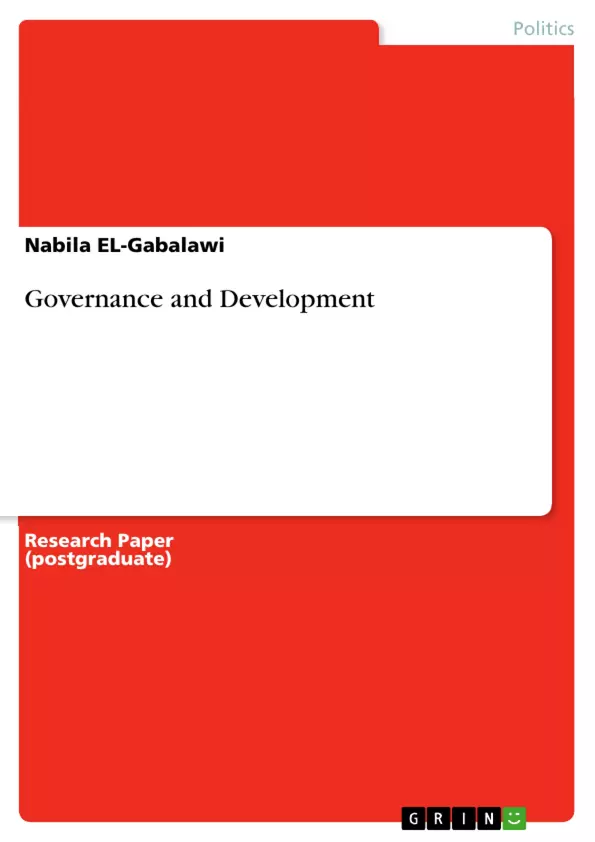“An effective state is vital for the provision of the goods and services and the rules and institutions –that allow markets to flourish and people to lead healthier, happier lives. Without it, sustainable development, both economic and social, is impossible”. World Development Report, 1997
This paper analyses the role of the Egyptian state, a middle-income country in the MENA region, in endorsing development and better governance. Discussed within are the policies undertaken by the state and an assessment of their impact on development and the quality of governance. This paper also includes an investigation into the compatibility of state role in supporting development and in mainstreaming and marinating better governance.
Inhaltsverzeichnis (Table of Contents)
- Introduction
- Socio-Economic and Political Background of Egypt
- The Role of the Egyptian State in Promoting Development
- The Egyptian Policies that foster Development
- The Social Safety Net Programs (SSNP)
- Education policy
Zielsetzung und Themenschwerpunkte (Objectives and Key Themes)
This paper examines the role of the Egyptian state in promoting development and better governance. It analyzes the policies undertaken by the state and assesses their impact on development and governance quality. The paper also explores the compatibility of the state's role in supporting development and in mainstreaming and maintaining better governance.
- The role of the Egyptian state in development and governance
- The impact of state policies on development and governance
- The compatibility of state roles in promoting development and better governance
- The influence of international actors and conditionalitities on Egyptian policies
- The role of civil society and NGOs in development
Zusammenfassung der Kapitel (Chapter Summaries)
The introduction emphasizes the crucial role of an effective state in fostering economic and social development. The paper then delves into the socio-economic and political background of Egypt, highlighting its development challenges and the impact of historical policies, including the Infitah policy. The chapter examines the economic difficulties faced by Egypt in the late 1970s and early 1980s, the reliance on foreign aid, and the introduction of the "Better Governance" concept in response to donor conditionalities. It discusses the complex relationship between Egypt's domestic development goals and its international obligations, exemplified by its involvement in the Gulf War and the peace process.
The next section focuses on the role of the Egyptian state in promoting development, emphasizing the importance of state action in alleviating poverty, promoting human rights, and achieving social justice. It outlines the various governmental actors involved in poverty alleviation, including the Ministry of Planning, the Ministry of Social Solidarity, and the Ministry of Education. The chapter also recognizes the growing role of NGOs in development and the participation of civil society in fostering democracy within Egypt.
The final section before the conclusion, "The Egyptian Policies that foster Development", explores specific policies implemented by the Egyptian state to promote development. The chapter highlights the Social Safety Net Programs (SSNP), including the welfare category and the developmental category, focusing on the Social Fund for Development (SFD). It analyzes the food subsidy program, its strengths and limitations, and the controversies surrounding the recent moves to lift subsidies. Finally, the chapter briefly touches upon the challenges and inconsistencies faced by the education policy in Egypt.
Schlüsselwörter (Keywords)
The key themes and concepts explored in this paper include development, governance, state role, policy analysis, socio-economic background, Infitah, foreign aid, donor conditionalities, social safety net programs, poverty alleviation, NGOs, civil society, education policy, and Egyptian context.
Frequently Asked Questions
What is the role of the state in Egypt's development?
The Egyptian state plays a central role in providing public services, implementing social safety nets, and managing economic policies to foster sustainable growth and social justice.
What are Social Safety Net Programs (SSNP) in Egypt?
SSNPs are governmental initiatives designed to protect the poor and vulnerable. Examples include food subsidies and the Social Fund for Development (SFD), which supports small enterprises and job creation.
How has the "Infitah" policy affected Egypt?
The Infitah (open-door policy) initiated in the 1970s marked a shift towards economic liberalization. It brought foreign investment but also led to increased socio-economic disparities and external debt challenges.
What is the significance of NGOs in Egypt's governance?
Non-Governmental Organizations (NGOs) are increasingly involved in poverty alleviation and social services, acting as partners or critics of the state in the process of democratization and development.
How do international donors influence Egyptian policy?
International aid often comes with conditionalities, such as requirements for "Better Governance" or economic reforms, which can create tension between domestic priorities and international obligations.
- Quote paper
- Nabila EL-Gabalawi (Author), 2008, Governance and Development, Munich, GRIN Verlag, https://www.grin.com/document/166069



